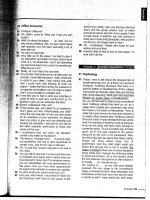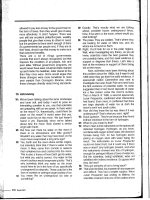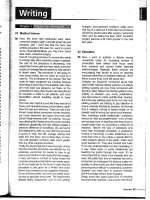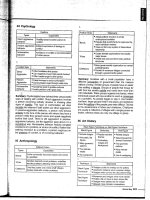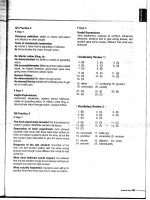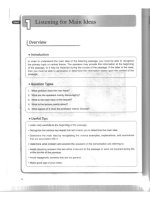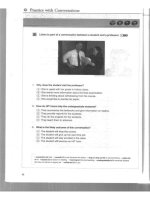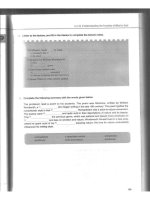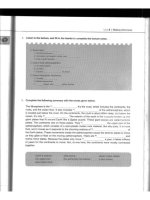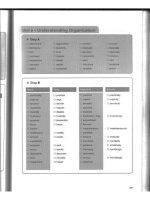Advanced Language Practice_03 pps
Bạn đang xem bản rút gọn của tài liệu. Xem và tải ngay bản đầy đủ của tài liệu tại đây (827.63 KB, 42 trang )
GRAMMAR 17 ARTICLES
has been (2) rise in (3) number of
(4) people unemployed, rather than (5) fall that
had been predicted. (6) rise was blamed on (7)
continuing uncertainty over (8) government economic policy,
and couldn't come at (9) worse time for (10)
Prime Minister, who is facing (11) growing criticism over
(12) way (13) present crisis is being handled.
(14) MPs are increasingly voicing (15) fears that
despite (16) recent devaluation of (17) pound and
cuts in (18) interest rates, (19) government still
expects (20) recovery of the economy to take three or even four
years. To make (21) matters worse, (22) „. number of
small businesses going into (23) liquidation is still at
(24) record level, and (25) housing market is
showing no signs of recovery. Some backbenchers expect (26)
general election before (27) end of (28) winter
unless there is (29) rapid change of (30) fortune.
2 Underline the most suitable option. A dash (-) means that no article is included.
a) Helen doesn't like the/- cream cakes sold in a/the local bakery.
b) The/- handball is fast becoming a/the popular sport worldwide.
c) We
could
see
that
the/—
Alps
were covered
in
the/- snow.
d) It's a/- long time since I met a/- lovely person like you!
e) Diana has a/- degree in the/- engineering from the/- University of London.
f) At the/- present moment, the/- man seems to have the/an uncertain future.
g) The/- problem for the/- today's students is how to survive financially,
h) The/- French enjoy spending holidays in the/- countryside.
i) Please do not turn on a/the water-heater in a/the bathroom,
j) Sue bought a/the Picasso I was telling you about the/- last week.
107
The activities include revision material.
In each space put a/an or the, or leave the space blank.
It has been announced that for (1)
third consecutive month there
ADVANCED LANGUAGE PRACTICE
b) On this record twins play piano duet.
c) The halfway through meal we realised what waiter had said.
d) If the Mrs Hillier phones, say I'm away on trip.
e) There is a wonderful scenery in eastern part of Turkey.
f) Cocker spaniel is one of most popular pet dogs.
g) There is going to be fog and a cold weather all the next week.
h) I spent very interesting holiday at the Lake Coniston in England.
i) We are against war in general, so of course we are against war like this
between superpower and developing country.
j) The burglaries are definitely on increase.
b) When I left station, I had to stand in queue for
taxi for long time.
c) We took trip around London and saw Tower
Bridge.
d) happiness of the majority depends on hard
work for everyone.
e) most main roads in this part of country follow
line of roads built by Romans.
f) Have you got latest record by Gipsy Kings?
g) If I had time, I would like to take up archery.
h) We spent pleasant evening having drinks at
Robin Hood.
i) Nile flows right through city.
j) summer I spent in USA was one of best in my life.
108
Correct the errors in these sentences.
a) It's not a first-class accommodation unless it has a private bathroom.
In each space put a/an or the, or leave the space blank.
a) I'm going to stand for Parliament at
next election.
GRAMMAR 17 ARTICLES
5 In each space put a/an or the, or leave the space blank.
Atlantic in
canoe.
b) Go down High Street and turn right into Mill
Road.
c) Please let me carry shopping. It's least I can do.
d) I don't like milk in coffee.
e) At end of busy day, sleep is
best tonic.
f) James Joyce I knew wasn't novelist and wasn't
Irish either.
g) We'll go for walk if sun comes out.
h) This is last time I do you favour for a while.
i) I'm staying in Hilton so you can leave me
message.
6 There are ten extra appearances of the in the following text. Underline them.
The word processor and the calculator are without a shadow of doubt here to
stay, and in the many respects our lives are the much richer for them. But the
teachers and other academics are claiming that we are now starting to feel the
first significant wave of their effects on a generation of the users. It seems
nobody under the age of 20 can spell or add up any more. Even several
professors at leading universities have commented on the detrimental effect the
digital revolution has had on the most intelligent young minds in the country.
The problem, evidently, lies with the automatic spellcheck now widely available
on the word processing software. Professor John Silver of the Sydney University,
Australia, said: 'Why should we bother to learn how to spell correctly, or for
that matter to learn even the most basic of the mathematical sums, when at the
press of a button we have our problem answered for us. The implications are
enormous. Will the adults of the future look to the computer to make the
decisions for them, to tell them who to marry or what the house to buy? Are we
heading for a future individual incapable of the independent human thought?'
109
a) She was
first woman to cross
ADVANCED LANGUAGE PRACTICE
7 In each space put a/an or the, or leave the space blank.
use of oxygen mask.
b) Paul spent half of his life in Far East.
c) You have to use at least pint and
half of milk.
d) Dick has sore throat and is taking medicine.
e) We arranged accommodation on outskirts of
city.
f) There is very difficult crossword in ' Times'.
g) Could you give me information I asked for in
letter I sent you?
h) I bought jewellery for my sister but it wasn't
kind she likes,
i) I always wanted to be astronaut but ambition
wore off.
j) And last of all, don't forget to put cat out for
night.
o Underline the most suitable option. A dash (-) means that no article is needed.
a) Brenda is the/- ideal for a/the job. She has a/- wealth of the/- experience.
b) The/- safety at the/- work is a/- major concern for us.
c) The/- poorest people in the/- country live in this city.
d) Have you seen a/the new 'Hamlet' at the/- National Theatre?
e) There is a/- beautiful countryside within an/- easy reach of a/the hotel.
f) I have a/- terrible cold and am staying in the/- bed today.
g) I earn £3 an/the hour as a/- supermarket cashier on the/- Saturdays,
h) The/- charge for an/- excess luggage is £10 a/the kilo.
i) The/- most of the/- life is a/- matter of getting on with the/- others,
j) This country is officially called The/- United Kingdom of The/- Great Britain
and The/- Northern Ireland.
110
a) Please watch
cabin attendant as she demonstrates
Explanations
Defining and non-
defining
Which and that
Who and whom
Whose
• Defining
A defining clause specifies which person or thing we mean. It cannot be
separated from the person or thing it describes.
By 4.30, there was only one painting which hadn't been sold.
• Non-defining
A non-defining clause contains extra information. In writing it is separated
by commas, and in speech, if used at all, is usually indicated by intonation.
By 4.30, which was almost closing time, nearly all the paintings had
been sold.
• Some of the points given below depend on the type of clause.
• These are alternatives in a defining clause, although which is felt to be
more formal.
By 4.30, there was only one painting that hadn't been sold.
• That is not normally used to introduce a non-defining clause.
The train, which was already an hour late, broke down again.
• That cannot follow a preposition.
It was a service for which I will be eternally grateful.
• That is often used instead of who in everyday speech in defining clauses.
Do you know the girl that lives next door?
• Whom is the object form of who and is used formally in object clauses.
He was a person whom everyone regarded as trustworthy.
• However, this is now felt to be excessively formal by most speakers and who
is commonly used instead.
• Whom has to be used if it follows a preposition.
To whom it may concern.
To whom am I speaking?
However, in everyday use, it is usual to avoid this kind of construction.
Who am I speaking to?
See when and where on the next page.
This means of whom. It is used in both defining and non-defining clauses.
Several guests, whose cars were parked outside, were waiting at the door.
Several guests whose rooms had been broken into complained to the manager.
Ill
ADVANCED LANGUAGE PRACTICE
When and where
Omitting the
relative pronoun
Sentences ending
in a preposition or
phrasal verb
Omitting
which/who + be
Which
Clauses beginning
with what and
whatever
• Non-defining
Here they follow a named time or place.
Come back at 3.30, when I won't be so busy.
I stopped in Maidstone, where my sister owns a shop.
• Defining
When follows words such as time, day, moment.
There is hardly a moment when I don't think of you, Sophia.
Where follows words such as place, house, street.
This is the street where I live.
This is common in defining object clauses especially in everyday conversation.
I've found the keys (which/that) I've been looking for.
That's the man (who/that) I was telling you about.
He was a person (who/that) everyone regarded as trustworthy.
Another common feature of conversational English, as outlined in who and
whom above, is to end a defining clause with a preposition.
That's the house I used to live in.
I couldn't remember which station to get off at.
He's not someone who I really get on with.
It may be possible to reduce a verb phrase after who/which to an adjectival
phrase in a defining clause, especially to define phrases such as the only one, the
last/first one.
Jim was the only one of his platoon who had not been taken prisoner.
Jim was the only one of his platoon not taken prisoner.
By 4.30, there was only one painting which had not been sold.
By 4.30, there was only one painting not sold.
A non-defining clause can comment on the whole situation described in the
main clause.
There
was
nobody
left
on the
train, which made
me
suspicious.
Phrases with which, such as at which time/point, in which case, by which time, in
which event can be used in the same way.
I watched the play until the end of the first act, at which point I felt I had
seen enough.
A warning sign 'Overheat' may come on, in which case turn off the appliance
at once.
• What meaning the thing or things which can be used to start clauses.
/ can't believe what you told me yesterday.
What you should do is write a letter to the manager.
See Grammar 14 Emphasis.
• Whatever, whoever, whichever can be used in a similar way.
You can rely on Helen to do whatever she can.
Whoever arrives first can turn on the heating.
112
GRAMMAR 18 RELATIVE CLAUSES AND NON-FINITE CLAUSES
Non-finite clauses
containing an
-ing
form
These are clauses without a main verb. The examples given here are non-
defining. Note that the two clauses have the same subject.
• Actions happening at the same time.
Waving their scarves and shouting, the fans ran onto the pitch.
• One action happening before another
Opening the letter, she found that it contained a cheque for £1,000.
This type of clause often explains the reason for something happening.
Realising there was no one at home, I left the parcel in the shed.
Both these types of sentence might begin with on or upon:
On opening the letter Upon realising
• An event which is the result of another event
/ didn't get wet, having remembered to take my umbrella.
• Where a passive construction might be expected, this is often shortened to a
past participle.
Having been abandoned by his colleagues, the Minister was forced to resign.
Abandoned by his colleagues, the Minister was forced to resign.
113
ADVANCED LANGUAGE PRACTICE
The following text contains many 'which's and 'that's. Underline the ten extra
ones, which are grammatically wrong.
Having just spent three weeks of my life sitting on an uncomfortable saddle,
pounding the roads of France, I am in no fit state that to do anything except sit
and write, which suits me fine. For I have cycled some 1,500 kilometres, a figure
which includes some extremely hilly routes, and frankly the thought of
mounting a bicycle again which is not one that I can face for a good few days
yet. The journey, which I undertook alone for most of the way, was all in the
name of charity - Help the Aged, a cause which I support whenever that I can.
Having organised my sponsorship, which I arrived in France armed only with a
tiny map of the Tour de France route, which hastily removed from last month's
'Cycling World' magazine. My intention which was to try and follow the route
that the professionals take, but after three days in which I pushed my body to
extremes that it had never experienced before, that I rapidly abandoned this
plan and returned to flatter ground. On the flat which I was able to keep to
about 120 kilometres a day, which is respectable. I did have to rest my weary
limbs at the weekends, though, which enabled me to recharge my batteries, by
which I mean my bodily ones, not the ones that inside my bike lights. I am
pleased to say, that after three tortuous weeks, which I ended up in Marseilles,
but what pleased me all the more is that I managed to raise over £2,000 for
Help the Aged.
Complete each sentence with one suitable word.
a) Midway through the second half City scored their fourth goal, at
114
point United gave up completely.
b) There is one person to I owe more than I can say.
c) It was the kind of accident for nobody was really to blame.
d) leaves last should turn off the lights.
e) Mary was late yesterday, was unusual for her.
f) At 6.00, was an hour before the plane was due, thick fog
descended.
g) I don't know told you that, but they were wrong.
h) The first time I saw you was you answered the door.
i) Mrs Brown was the first owner dog won three prizes in the
same show,
j) I've just spoken to Sally, sends you her love.
GRAMMAR 18 RELATIVE CLAUSES AND NON-FINITE CLAUSES
b) We suggested a lot of things, which were all rejected.
was
Everything rejected.
c) If someone understands this book, they are cleverer than I am.
is
Anyone cleverer than I am.
d) I won't tell you this again, you naughty boy.
time
This tell you, you naughty boy.
e) The whole summer was sunny and warm, for a change.
made
The whole summer was sunny and warm,
nice change.
f) I don't really approve of his proposal.
what
I don't really approve of proposing.
g) The police never caught the culprit.
committed
The police never caught the crime.
h) I have read all of her books but one.
that
There is only I have not read.
i) I can't remember the last heavy rain.
when
I can't remember heavily.
j) Do you get on with your next-door neighbour?
who
Do you get on with lives next door?
115
gave up.
3 Complete the second sentence so that it has a similar meaning to the first
sentence, using the word given. Do not change the word given.
a) I waited for him until 6.30 and then gave up.
which
I waited for him until 6.30,
ADVANCED LANGUAGE PRACTICE
4 Make one sentence from the sentences given, beginning as shown. Make any
other necessary changes. Omit any unnecessary relative pronouns.
a) We eventually caught a train. It was one that stops at every station.
The train
b) Carol slammed the door behind her. Her father had given her a car as a
present. She drove off in it.
Slamming
c) At the end of the street was a building. The street was crowded with
shoppers. Tom had not noticed the building before.
At the end of the street
d) Some people have just moved in next door. They have the same surname as
some other people. Those other people have just moved out.
The people who have just moved in next door
e) I noticed that the door was open. I decided to go in. This turned out to be a
mistake.
Noticing
f) Everyone expects the Popular Party candidate, Flora Benstead, to win the
election. She has announced that she will cut income tax by 10% if elected.
Flora Benstead,
g) I listened to George patiently until he started insulting me. At that point, I
told him a few home truths. He didn't like it.
I listened to George patiently until he started insulting me,
h) Pauline asked me a question. I had no reply to it.
Pauline asked me
i) He rushed out of the room. He was shouting at the top of his voice. This was
typical.
Shouting
116
GRAMMAR 18 RELATIVE CLAUSES AND NON FINITE CLAUSES
5 Correct the mistake in each sentence. Omit any unnecessary relative pronouns in
your corrections.
c) Most of the guests turned up two hours early, that took us by surprise.
d) Whoever that he spoke to last was probably the person who murdered him.
e) The book I bought for his birthday is one where I enjoyed very much myself.
f) There's a chance that I may be late, in that case I'll phone you.
g) Everyone admires her. She's the kind of person whose everyone looks up to.
h) No one knows who she is. She is the only member of the gang who the
identity remained a secret
6 Most of the following sentences are punctuated incorrectly. Correct any that are
wrong.
a) Many people think that Saturn is the biggest planet which is wrong.
b) That's the man, I used to live next door to.
c) I couldn't remember, which house I had to deliver the card to.
d) The coat she wore to the party, was similar to one I have at home.
e) Lynn is the only person in my circle of friends, who is married.
f) Whoever catches the ball, must come into the middle of the circle.
117
Verbs followed by
either -ing or
infinitive with to
Explanations
This unit focuses on problem areas.
• Can't bear, hate, like, love, prefer
Like to usually refers to habitual preferences.
We like to go out to lunch on Sunday.
Not like to means think it wrong to.
I don't like to disturb colleagues at home.
• Attempt, begin, continue, intend, plan, propose, start
There is no difference in meaning whether we use -ing or infinitive with to.
Intend, plan, and propose can be followed by that + clause. This may include
should. See Grammar 16 Reporting verbs.
• Forget, remember
With to both verbs refer to an obligation.
/ had to
phone
the
office
but I
forgot
to do it.
With -ing both verbs refer to past events.
/ don't remember learning to walk.
Both can be followed by that + clause.
/ remembered that I had to pay the phone bill.
•
Try
With to this refers to something attempted, which might fail or succeed.
/ tried to warn him, but it was too late.
With -ing this refers to making an experiment, or to a new experience.
Try taking an aspirin. You'll feel better.
Have you tried -windsurfing? It's great!
• Go on
With -ing this refers to the continuing of an action.
She went on working even though it was late.
With to this refers to the continuation of a speech.
The Prime Minister went on to praise the Chancellor.
(This means the Prime Minister continued his speech by praising the
Chancellor.)
• Mean
With the meaning intend, this is followed by to.
Sony, I meant to tell you about the party.
With -ing, and an impersonal subject, this refers to what is involved.
If we catch the early train, it will mean getting up at 6.00.
That + clause is possible when meaning is being explained.
This means that you have to report to the police station.
118
GRAMMAR 19 VERBS + INFINITIVE OR INC
Verbs with an
object, followed
by either -ing or
infinitive with to
• Regret
With to this refers to the speaker's regrets about what is going to be said. It
often occurs in formal statements of this kind.
We regret to inform you that your application has been unsuccessful.
With -ing this refers to a regret about the past.
/ regret saying that to him.
That + clause is also possible.
We
regret
that
we
didn't tell
her
earlier.
• Stop
With to this refers to an intention.
Jane stopped to check the oil level in the engine.
With -ing this refers to the ending of an activity.
The baby has stopped waking up during the night now.
• Hear, see, watch
When followed by infinitive without to, the action is complete.
We watched all the cars cross the finishing line.
With -ing, the action is still in progress.
/ heard someone coming up the stairs.
• Admit
This can be used with or without to followed by -ing.
They admitted (to) being members of the gang.
That + clause is also possible.
He admitted that he was wrong.
• Allow, forbid, permit
With an object and to:
The school forbids students to smoke in the classrooms.
With an object -ing form:
The school does not allow smoking.
• Consider
With an object and to this refers to an opinion.
She is considered to be the finest pianist of her generation.
With -ing this means think about.
At one point I considered emigrating to Canada.
With that + clause it refers to an opinion.
We consider that she has behaved badly.
• Imagine
With an object and to:
/ imagined the castle to be haunted.
With -ing, an object is also possible.
/ couldn't imagine (her) living in a place like that.
With that + clause it means suppose.
I
imagine
that
you'd like
a cup of tea
after
your
long
journey!
119
ADVANCED LANGUAGE PRACTICE
Verbs normally
followed by
infinitive with to
• Require
With an object and to:
They required him to fill out a form.
With -ing:
These letters require typing.
See Grammar 7 for needs doing.
• Verbs marked * can also be followed by that + clause.
Verbs normally
followed by -ing
*agree
*appear
*arrange
attempt
ask
choose
dare
*decide
*demand
deserve
*expect
fail
grow
hasten
*happen
*hope
hurry
*learn
long
manage
neglect
offer
pay
*plan
*pledge
*pretend
*promise
refuse
*resolve
seek
*seem
struggle
*swear
*threaten
*vow
want
*wish
• Appear, (so) happen and seem are only used impersonally with that + clause.
It appears that I've made a mistake.
It so happens that he is my brother!
It seems that Mary is going to win.
• Want can be used colloquially with -ing, and has a similar meaning to need.
The car wants cleaning.
• Verbs marked * can also be followed by that + clause.
*appreciate
avoid
contemplate
delay
*deny
detest
dislike
endure
enjoy
escape
excuse
face
*fancy
finish
involve
*mention
mind
miss
postpone
practise
*resent
risk
*suggest
it's no good/use
feel like
give up
keep on
leave off
look forward to
put
off
can't stand
spend/waste time
• Appreciate is often followed by possessive + -ing.
I appreciate your trying to help.
• See Grammar 16 for suggest.
• Involve has an impersonal subject.
Being an athlete involves regular training.
120
GRAMMAR 19 VERBS + INFINITIVE OR INC
Verbs followed by
infinitive without
to
Verbs followed by
an object and to
• Help can be used with or without to.
/ helped George (to) carry the bags.
• Make, and expressions with make
They made me leave.
We shall have to make do.
In the passive, to is used.
/ was made to leave.
• Let and expressions with let
They didn't let me leave.
Let me go!
• Verbs marked * can also be followed by that + clause.
*advise, assist, beg, bribe, command, dare, employ, enable, encourage, instruct,
invite, lead, *order, *persuade, select, send, *teach, *tell, train, urge, *wam
• See Grammar 16 for advise, persuade, tell, warn.
• Dare can be used without to when there is no object. Compare:
They dared him to jump.
I didn't dare (to) say anything.
How dare you speak like that to me!
121
ADVANCED LANGUAGE PRACTICE
Underline the word or phrase that is correct.
a) What do you mean to do/doing about the leaky pipes?
b) I never imagined the mountains to be/being so high!
c) Don't forget to wake me/waking me before you leave.
d) I regret to tell you/telling you that we cannot accept your offer.
e) Did you manage to find/finding the book you were looking for?
f) I tried taking/to take that medicine you gave me but I couldn't swallow it.
g) We have postponed to tell/telling anyone the news until after Christmas,
h) Have you considered to buy/buying a microwave oven?
i) Sorry I'm late, I had to stop to pick up/picking up the children from school,
j) Margaret was slow at school, but she went on to be/being Prime Minister.
2 Complete the sentences by choosing the correct verb from the box, and putting
it in the appropriate form.
122
a) It's too late to buy any food. We'll have to make .
we've got.
with what
b) I hardly ask how much it cost!
c) Have you ever taking a year off work?
d) I didn't like the town at first, but I to love it eventually.
e) What do you doing after this course has finished?
f) We are all our holiday in Australia this year. It's going to be
such an adventure.
g) Jim and I to meet at 6.00 but he didn't turn up.
h) It that we won't need to pay so much after all.
i) I can't wait for Saturday! I'm really to see you!
j) I can't getting up at 6.30 tomorrow morning! I'll catch a later
train.
GRAMMAR 19 VERBS + INFINITIVE OR -INC
3 Complete the second sentence so that it has a similar meaning to the first
sentence, using the word given. Do not change the word given.
b) If I take the job I'll have to move to Paris.
mean
Taking moving to Paris.
c) Parking is not permitted here.
park
You are
here.
d) 'Shall I carry that bag for you, Pauline?' said John.
offered
John bag for her.
e) Winning the football pools meant we could buy a new car.
enabled
Winning the football pools buy a new car.
f) There is a risk that he will miss the plane if he waits.
risks
He if he waits.
g) I believed you were the murderer because of this clue.
led
This clue that you were the murderer.
h) Does using the hotel swimming pool cost extra?
pay
Do you have to the hotel swimming pool?
i) I think that this is the right street.
appears
This the right street.
j) Jean succeeded in finishing all her work on time.
managed
Jean all her work on time.
123
me a lift.
a) It's very kind of you to give me a lift.
appreciate
ADVANCED LANGUAGE PRACTICE
b) Calling Jim is pointless, because his phone is out of order.
use
It's no because his phone is out of order.
c) It is compulsory for all students to leave a cash deposit.
required
All students leave a cash deposit.
d) You waste time if you copy your work out again, so don't do it.
copying
Don't your work out again.
e) I bet you wouldn't ask David to come with you to the party!
if
I dare to the party with you!
f) 'Please don't leave me on my own/ Martin begged us.
him
Martin begged us own.
g) If you work for this company, you have to travel a lot.
involves
Working for this company of travel.
h) Joe doesn't like it when people treat him like a child.
resents
Joe like a child.
i) It was resolved that the matter would be brought up at the next meeting.
bring
They resolved up at the next meeting.
j) The police were told that the use of unnecessary force was forbidden.
not
The police were instructed unnecessary force.
124
4 Complete the second sentence so that it has a similar meaning to the first
sentence, using the word given. Do not change the word given.
a) They said they would like me to stay with them in Florida.
invited
They stay with them in Florida.
GRAMMAR 19 VERBS + INFINITIVE OR INC
b) That's all for now. I (hope) hear from you soon!
c) If I take the new job, it (mean) working a lot harder!
d) Are you still tired? Or do (feel) going out for a meal?
e) Jane is (say) the most outstanding player in the team.
f) I wish you (keep) complaining all the time!
g) How (suggest) that I would take a bribe! I've never been
so insulted!
h) We offered to help Helen carry her bags, but she said she
(manage) on her own.
Complete the text by putting the verbs in brackets into the correct form, gerund
or infinitive.
125
Complete each sentence using the verb in brackets in an appropriate form.
a) Sorry, I meant (tell) I would be out, but I forgot.
Yukie Hanue is considered by many (1)
(be) the finest violinist of
her generation - and she's still in her early twenties. When we visited her, in
the music department of the University of New York, she was too busy
practising (2) (talk), but she invited us (3) (have) a
coffee with her in her mid-morning break. Astonishingly, she manages
(4) (combine) her PhD at the university with international
concerts and recitals, numerous public appearances and interviews. She
evidently thrives on the workload, buzzing around the place with an industrious
enthusiasm that leaves us all breathless. Her fame as a performer means
(5) (make) regular appearances at high profile events. Last
month, for example, she agreed (6) (appear) in a series of recitals
organised by Coca-Cola. This involved (7) (travel) to far-flung
places like Seoul, Oslo and Montevideo on successive days, a schedule which
would have caused any normal person to wilt. T can't stand (8)
(do) nothing,' she says. T happen (9) (have) a particular talent,
and it would be wasteful not (10) (exploit) it to the full.' I
encouraged her (11) (tell) me about her upbringing, but she was
rather reticent to sing her own praises. I did, however, succeed in persuading
her (12) (confess) to a secret desire. 'If I hadn't been a musician, I
would have loved to train (13) (become) a martial arts expert,'
she says. Certainly, she would have had the discipline, but I couldn't imagine
someone so physically frail actually (14) (stand) there hitting
someone. But it was an interesting revelation, and one that I was
(15) (learn) more about during my day with her.
b) Everything I told you was true.
all
I told you a lot which were true.
c) According to reports, the President is in poor health.
reported
The President in poor health.
d) Julia's inheritance meant that she could give up work.
enabled
Julia's inheritance give up work.
e) Stupidly, I left my umbrella at home.
which
I left my umbrella at home, thing to do.
f) We received a warning to stay at home.
should
We were stay at home.
g) You could easily become ill unless you give up smoking.
risk
If you don't stop ill.
h) The decorators didn't leave too much mess when they did the job.
without
The decorators managed too much mess.
i) It's pointless to worry about someone else's problems.
no
There about someone else's problems.
j) According to Valerie, she is a relation of mine.
be
Valerie claims to me.
126
Complete the second sentence so that it has a similar meaning to the first
sentence, using the word given. Do not change the word given.
a) You haven't seen my pen anywhere, have you?
happen
You
don't
. my pen anywhere, have you?
GRAMMAR 20 CONSOLIDATION 4
b) In circumstances I would say he hasn't chance.
c) I'd like to buy piano one day but I haven't got
money.
d) Could you give me hand to take rubbish downstairs?
e) girl I told you about is one on left.
f) address is: Park Hotel, 42 Castle Road,
Dover.
g) Mary spent year and half working with sick people
in Africa.
h) medicine doctor gave me makes me feel tired all day.
i) Dawson put ball in net early in second half but
goal was disallowed.
j) Terry became teacher with best exam results in
school.
3 Complete each sentence using the verb given in brackets in an appropriate form.
len: it on me UCSK.
b) If you feel so tired in the morning, why (try)
going to bed earlier!
c) The returning officer announced to the crowd that the Democratic candidate
(win).
d) If I took a job like that, it (mean) earning less
money.
e) Do you still feel ill? Or (fancy) coming
shopping with me tomorrow?
f) I saw Harry arrive, but I don't remember (see)
him leave.
g) All my family were sitting in the front row, which
(make) nervous.
h) There is a rumour that the army is about to take power, though this
(deny) by government sources.
i) Sandra trained (be) an architect but ended up as
a rock star.
j) It's hard (believe) that Jim would be so brave.
127
a) I didn't know where
(send) the parcel to, so I
a) That's
last time that I go to horror film.
2 Complete the sentences with a/an, the or leave the space blank.
ADVANCED LANGUAGE PRACTICE
b) After six months, Joe's search for a job was successful.
managed
After six months, Joe a job.
c) Jean was given permission by her boss to take a day off.
agreed
Jean's boss take a day off
d) Although Sue looked for the book for a long time, she couldn't find it.
spent
Sue , without success.
e) All visitors to the town fall in love with it.
those
All fall in love with it.
f) The headteacher warned Tom that she might expel him.
threatened
The headteacher expulsion.
g) I didn't expect to see you here!
last
This is to see you!
h) We haven't seen one another for a long time.
other
We stopped ago.
i) I don't know who did the washing up, but they didn't do it very well!
make
Whoever good job of it!
j) Janet came first, which surprised nobody.
when
Nobody Janet came first.
128
Complete the second sentence so that it has a similar meaning to the first
sentence, using the word given. Do not change the word given.
a) Does parking here cost anything?
pay
Do I need here?
GRAMMAR 20 CONSOLIDATION 4
already full of (2) commuters when Rale boarded it with fifteen minutes
to go before its departure. He registered (3) vague annoyance at this, as
it meant he had to actually communicate with a fellow passenger in order to
find (4) one remaining window seat in his normal carriage, (5)
carriage C. Rale always made a point of travelling in the middle carriage for
(6) safety's sake - about such things as (7) safety he was
meticulous - and would only venture into (8) first four carriages, or for
that matter (9) last four, in (10) extreme emergencies. Rale was
nothing if not a creature of (11) habit; it bothered him intensely if he
was unable to get a window seat or if (12) drinks trolley lady didn't
come round, or worse still, she came but (13) hot water boiler wasn't
working and so (14) coffee was not available. A brioche and a cup of
coffee - black, one sugar - was Rale's early-morning indulgence. He found it
sufficed for a breakfast, unless he was unusually hungry. Exactly ten minutes
into (15) journey, Rale opened his briefcase and took out his copy of
that morning's Guardian newspaper, neatly folded, and began (16)
crossword. This was (17) time of day Rale liked best. He could immerse
himself in (18) delightful challenge of teasing out words from his mind,
and put off (19) thoughts of work in the administrative department of
(20) Southampton Hospital. Today, however, Rale's neatly planned
existence was to be well and truly turned on its head.
6 Complete the sentences with one suitable word in each space.
b) That's the couple house my sister bought.
c) buys the wardrobe will have to arrange to pick it up
themselves.
d) Why don't you phoning Directory Inquiries? They might
know.
e) Do you going out for a pizza later on?
f) That's an experience I rather forget.
g) The police officer us open the boot of the car.
h) It is recommended that all luggage bear a personal label.
i) The children always look to Christmas as they love all the
parties and presents,
j) Charles is not the kind of person would help you.
129
5 Write the word the, where it is appropriate in the text, in the places indicated.
(1)
6.45 train, which went from Winchester to Southampton, was
a) There is nobody for we feel greater respect.
ADVANCED LANGUAGE PRACTICE
(2) issue you with a licence to set up a hamburger
stall in front of King's College.
The area concerned (3) to be one of the most
picturesque in England, and we do not normally
(4) trading on such commonly photographed
areas. Furthermore, the college authorities have (5)
your proposal, on the grounds that it might generate litter and undesirable
fumes. In the past we have received a large number of applications for trade
access to this site, and in each case access has been
(6)
In your letter you (7) that the King's College site
was one of three you had in mind. You might like
(8) establishing your stall in front of Cambridge
United football ground, in (9) your application
should be made direct to the football club, and not to ourselves.
Please would you (10) writing that you have
received this letter.
130
that we are
Dear Mr Little,
We regret (1)
7 Using the notes as a guide, complete the letter. Use one or two words in each
space. The words you need do not appear in the notes.
Re: Application for hamburger stall in front of King's College, Cambridge
Write to say:
Sorry to tell you we can't give you a licence.
Many people think it's a particularly picturesque view.
We don't normally let people sell things in areas where tourists take pics.
The college authorities have said they don't want a stall there - litter and fumes.
We've received similar applications, and we've always said no.
You said in your letter you had 3 possible sites.
You should think about approaching Cambridge United Football Club.
If you decide to do so, apply directly to them.
Please write to us to say you've received this letter - we need to be sure.
Explanations
Verbs followed by
for
Verbs followed by
of
Verbs followed by
with
This unit focuses on a selection of verbs, including their adjectival forms. Many
verbs have other uses followed by -ing or infinitive (see Grammar 18, 19).
Passive uses with by are not included. See also Grammar 23, 24, 25.
absorbed in something (especially absorbed in her work/a book)
confide in someone
be engrossed in something
implicate someone in something
involve someone in something
result in something
specialise in something
succeed in something
account for something
allow for something (to take into consideration)
apologise for something/someone (on their behalf: Let me apologise for Jack.)
blame someone for something
care for something/someone
cater for something/someone
charge someone for something (make them pay for it)
count for something (especially: / count for nothing in this company.)
earmark something for a particular use
pay for someone/something
accuse someone of something
convict someone of something
remind someone of something
suspect someone of something
acquaint someone with something
associate someone with something
charge someone with something
clutter with something (especially passive: The room was cluttered with boxes.)
coincide with something
collide with something
comply with something
concern with something (usually passive: be concerned with)
confront someone with something
confuse someone/something with someone/something
cram with something (especially passive: be crammed with)
131
Verbs followed by
in
